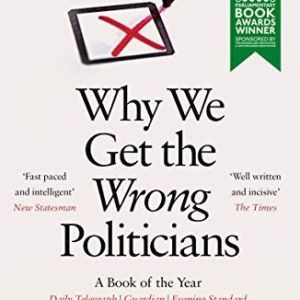Want to know what books Gady Epstein recommends on their reading list? We've researched interviews, social media posts, podcasts, and articles to build a comprehensive list of Gady Epstein's favorite book recommendations of all time.
1

The celebrated author of A Spy Among Friends and Rogue Heroes returns with his greatest spy story yet, a thrilling Cold War-era tale of Oleg Gordievsky, the Russian whose secret work helped hasten the collapse of the Soviet Union.
If anyone could be considered a Russian counterpart to the infamous British double-agent Kim Philby, it was Oleg Gordievsky. The son of two KGB agents and the product of the best Soviet institutions, the savvy, sophisticated Gordievsky grew to see his nation's communism as both criminal and philistine. He took his first posting for... more The celebrated author of A Spy Among Friends and Rogue Heroes returns with his greatest spy story yet, a thrilling Cold War-era tale of Oleg Gordievsky, the Russian whose secret work helped hasten the collapse of the Soviet Union.
If anyone could be considered a Russian counterpart to the infamous British double-agent Kim Philby, it was Oleg Gordievsky. The son of two KGB agents and the product of the best Soviet institutions, the savvy, sophisticated Gordievsky grew to see his nation's communism as both criminal and philistine. He took his first posting for Russian intelligence in 1968 and eventually became the Soviet Union's top man in London, but from 1973 on he was secretly working for MI6.
For nearly a decade, as the Cold War reached its twilight, Gordievsky helped the West turn the tables on the KGB, exposing Russian spies and helping to foil countless intelligence plots, as the Soviet leadership grew increasingly paranoid at the United States's nuclear first-strike capabilities and brought the world closer to the brink of war. Desperate to keep the circle of trust close, MI6 never revealed Gordievsky's name to its counterparts in the CIA, which in turn grew obsessed with figuring out the identity of Britain's obviously top-level source. Their obsession ultimately doomed Gordievsky: the CIA officer assigned to identify him was none other than Aldrich Ames, the man who would become infamous for secretly spying for the Soviets.
Unfolding the delicious three-way gamesmanship between America, Britain, and the Soviet Union, and culminating in the gripping cinematic beat-by-beat of Gordievsky's nail-biting escape from Moscow in 1985, Ben Macintyre's latest may be his best yet. Like the greatest novels of John le Carré, it brings readers deep into a world of treachery and betrayal, where the lines bleed between the personal and the professional, and one man's hatred of communism had the power to change the future of nations. less 
Casey Neistatjust finished this yesterday. absolutely fantastic book. super recommend if you're into spycraft and espionage. bravo @BenMacintyre1 https://t.co/4OG4C1cBQ1 (Source)

Isabel Hardman@holland_tom @BenMacintyre1 Oh it’s a brilliant book isn’t it. Another one I was sad to finish. (Source)

Amrullah SalehI had a great conversation with Ambassador Micheal Lund Jeppesen of @DKinAfghanistan . On the sidelines of our rich conversation we spoke of the Spy & the Traitor a great book in which Denmark's intelligence features highly. Proud of our alliance & cooperation. https://t.co/47GMb7ETWr (Source)
2

The Internet was going to liberate us, but in truth it has not. For every story about the web's empowering role in events such as the Arab Spring, there are many more about the quiet corrosion of civil liberties by companies and governments using the same digital technologies we have come to depend upon. In Consent of the Networked, journalist and Internet policy specialist Rebecca MacKinnon argues that it is time to fight for our rights before they are sold, legislated, programmed, and engineered away. Every day, the corporate sovereigns of cyberspace (Google and Facebook, among... more The Internet was going to liberate us, but in truth it has not. For every story about the web's empowering role in events such as the Arab Spring, there are many more about the quiet corrosion of civil liberties by companies and governments using the same digital technologies we have come to depend upon. In Consent of the Networked, journalist and Internet policy specialist Rebecca MacKinnon argues that it is time to fight for our rights before they are sold, legislated, programmed, and engineered away. Every day, the corporate sovereigns of cyberspace (Google and Facebook, among others) make decisions that affect our physical freedom—but without our consent. Yet the traditional solution to unaccountable corporate behavior—government regulation—cannot stop the abuse of digital power on its own, and sometimes even contributes to it.
A clarion call to action, Consent of the Networked shows that it is time to stop arguing over whether the Internet empowers people, and address the urgent question of how technology should be governed to support the rights and liberties of users around the world.
less 
Danielle CitronAs @rmack described in her powerful book Consent of the Networked, it is digibonapartism. So worth a reread especially today as you note with China as a leader in this effort. @imran_malek Just read the book in our free speech in a digital age class. Always illuminating. https://t.co/N7y7cDgGGF (Source)

Gady EpsteinRebecca, used to be a [CNN] journalist here. Her work on the internet in China and on internet freedom in general has been very important in the field and a lot of people have cited her work. Her book provides a sober context for understanding how the Chinese internet works. (Source)
3

China has lived with the Internet for nearly two decades. Will increased Internet use, with new possibilities to share information and discuss news and politics, lead to democracy, or will it to the contrary sustain a nationalist supported authoritarianism that may eventually contest the global information order?
This book takes stock of the ongoing tug of war between state power and civil society on and off the Internet, a phenomenon that is fast becoming the centerpiece in the Chinese Communist Party's struggle to stay in power indefinitely. It interrogates the dynamics of this... more China has lived with the Internet for nearly two decades. Will increased Internet use, with new possibilities to share information and discuss news and politics, lead to democracy, or will it to the contrary sustain a nationalist supported authoritarianism that may eventually contest the global information order?
This book takes stock of the ongoing tug of war between state power and civil society on and off the Internet, a phenomenon that is fast becoming the centerpiece in the Chinese Communist Party's struggle to stay in power indefinitely. It interrogates the dynamics of this enduring contestation, before democracy, by following how Chinese society travels from getting access to the Internet to our time having the world's largest Internet population. Pursuing the rationale of Internet regulation, the rise of the Chinese blogosphere and citizen journalism, Internet irony, online propaganda, the relation between state and popular nationalism, and finally the role of social media to bring about China's democratization, this book offers a fresh and provocative perspective on the arguable role of media technologies in the process of democratization, by applying social norm theory to illuminate the competition between the Party-state norm and the youth/subaltern norm in Chinese media and society. less 
Gady EpsteinYes, I wouldn’t say this is the layman’s guide to the internet. Maybe none of these books quite are. They get very deep into the ideological weeds, because that gets to the core of whether authoritarian management of the internet can work. In After the Internet, Before Democracy, Lagerqvist tries to find a middle ground between technological determinism/cyberutopianism – this notion that the... (Source)
4

Since the mid-1990s, the Internet has revolutionized popular expression in China, enabling users to organize, protest, and influence public opinion in unprecedented ways. Guobin Yang's pioneering study maps an innovative range of contentious forms and practices linked to Chinese cyberspace, delineating a nuanced and dynamic image of the Chinese Internet as an arena for creativity, community, conflict, and control. Like many other contemporary protest forms in China and the world, Yang argues, Chinese online activism derives its methods and vitality from multiple and intersecting forces, and... more Since the mid-1990s, the Internet has revolutionized popular expression in China, enabling users to organize, protest, and influence public opinion in unprecedented ways. Guobin Yang's pioneering study maps an innovative range of contentious forms and practices linked to Chinese cyberspace, delineating a nuanced and dynamic image of the Chinese Internet as an arena for creativity, community, conflict, and control. Like many other contemporary protest forms in China and the world, Yang argues, Chinese online activism derives its methods and vitality from multiple and intersecting forces, and state efforts to constrain it have only led to more creative acts of subversion. Transnationalism and the tradition of protest in China's incipient civil society provide cultural and social resources to online activism. Even Internet businesses have encouraged contentious activities, generating an unusual synergy between commerce and activism. Yang's book weaves these strands together to create a vivid story of immense social change, indicating a new era of informational politics. less 
Gady EpsteinYang Guobin is looking at online activism dating back to the 1990s. He writes about a number of different cases, over the years, where average citizens, because of the ability to post online, have been able to effect change. He thinks that fact, in itself, is significant and, in a sense, democratizing with a small “d.” He goes back to the case of Sun Zhigang, the migrant worker who was beaten to... (Source)
5

Click here to hear Anne-Marie Brady's BBC World Service radio documentary titled "The Message from China" China's government is no longer a Stalinist-Maoist dictatorship, yet it does not seem to be moving significantly closer to democracy as it is understood in Western terms. After a period of self-imposed exclusion, Chinese society is in the process of a massive transformation in the name of economic progress and integration into the world economy. The Chinese Communist Party (CCP) is seeking to maintain its rule over China indefinitely, creating yet another "new" China. Propaganda and... more Click here to hear Anne-Marie Brady's BBC World Service radio documentary titled "The Message from China" China's government is no longer a Stalinist-Maoist dictatorship, yet it does not seem to be moving significantly closer to democracy as it is understood in Western terms. After a period of self-imposed exclusion, Chinese society is in the process of a massive transformation in the name of economic progress and integration into the world economy. The Chinese Communist Party (CCP) is seeking to maintain its rule over China indefinitely, creating yet another "new" China. Propaganda and thought work play a key role in this strategy. In this important book, noted China scholar Anne-Marie Brady answers some intriguing questions about China's contemporary propaganda system. Why have propaganda and thought work strengthened their hold in China in recent years? How has the CCP government strengthened its power since 1989 when so many analysts predicted otherwise? How does the CCP maintain its monopoly on political power while dismantling the socialist system? How can the government maintain popular support in China when the uniting force of Marxist-Leninist-Maoist ideology is spent and discredited? What has taken the place of communist ideology? Examining propaganda and thought work in the current period offers readers a unique understanding of how the CCP will address real and perceived threats to stability and its continued hold on power. This innovative book is a must-read for everyone interested in China's growing role in the world community. less 
Gady EpsteinAnne Marie Brady has done a lot to advance the notion that, contrary to what some people felt in the 1990s, China’s efforts at propaganda and thought-work have actually intensified since 1989, not weakened. Some people argue that the effectiveness of China’s propaganda system has become weaker over that time – as China’s media has become more commercialized, as society has become more pluralized,... (Source)
6

Jonathan D. Spence | 3.88
In 1728 a stranger handed a letter to Governor Yue calling on him to lead a rebellion against the Manchu rulers of China. Feigning agreement, he learnt the details of the plot and immediately informed the Emperor, Yongzheng. The ringleaders were captured with ease, forced to recant and, to the confusion and outrage of the public, spared.
Drawing on an enormous wealth of documentary evidence - over a hundred and fifty secret documents between the Emperor and his agents are stored in Chinese archives - Jonathan Spence has recreated this revolt of the scholars in fascinating and chilling... more In 1728 a stranger handed a letter to Governor Yue calling on him to lead a rebellion against the Manchu rulers of China. Feigning agreement, he learnt the details of the plot and immediately informed the Emperor, Yongzheng. The ringleaders were captured with ease, forced to recant and, to the confusion and outrage of the public, spared.
Drawing on an enormous wealth of documentary evidence - over a hundred and fifty secret documents between the Emperor and his agents are stored in Chinese archives - Jonathan Spence has recreated this revolt of the scholars in fascinating and chilling detail. It is a story of unwordly dreams of a better world and the facts of bureaucratic power, of the mind of an Emperor and of the uses of his mercy. less 
Gady EpsteinI suppose I’m cheating because there was no internet in the 18th century. But it happens to be my favourite book of Jonathan Spence’s and it’s on a theme that is very relevant today, which is control of how rumours and information spread. So this is about the Yongzheng Emperor, who becomes concerned about a treasonous letter that is written somewhere in some part of China. He doesn’t know much... (Source)
Don't have time to read Gady Epstein's favorite books? Read Shortform summaries.
Shortform summaries help you learn 10x faster by:
- Being comprehensive: you learn the most important points in the book
- Cutting out the fluff: you focus your time on what's important to know
- Interactive exercises: apply the book's ideas to your own life with our educators' guidance.


